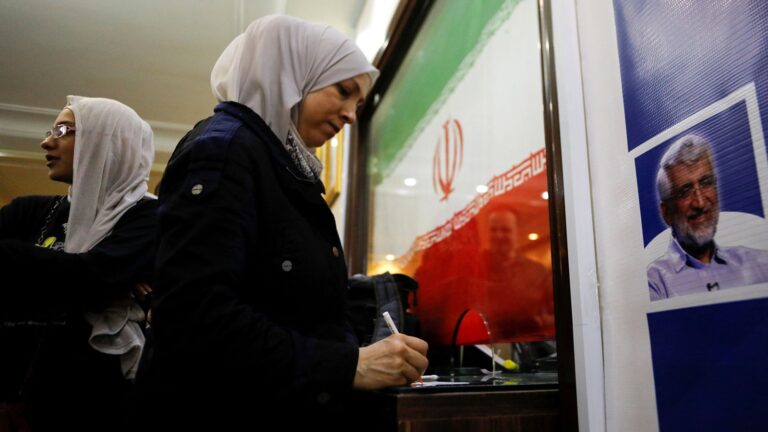Iranians began voting on Friday to choose a new president from among four candidates loyal to the tightly controlled supreme leader amid growing public discontent following the death of Ebrahim Raisi in a helicopter crash.
State television showed queues at polling stations in several cities. More than 61 million Iranians are eligible to vote. Polls were due to close at 6 pm (14:30 GMT) but usually extend until midnight.
The election coincides with a period of rising regional tensions due to Israel’s war with Iran’s allies Hamas in the Gaza Strip and Hezbollah in Lebanon, as well as increasing Western pressure over Iran’s burgeoning nuclear program.
The election is unlikely to bring about any major changes in Iranian policy, but its outcome could have implications for who will succeed Iran’s Supreme Leader Ayatollah Ali Khamenei, 85, who has been in power since 1989.
Khamenei called for high voter turnout to ease a crisis of legitimacy caused by public discontent over economic hardship and restrictions on political and social freedoms. “The longevity, strength, dignity and reputation of the Islamic Republic depends on the existence of its people,” he said on state television after the vote. “A high voter turnout is absolutely necessary.”
Voter turnout has plummeted over the past four years as young people become frustrated with political and social restrictions.
It is expected to take two days for the final results to be announced as ballots are counted by hand, but the first figures could be released around noon on Saturday. If no candidate receives at least 50% plus one of the total votes, including blank votes, a runoff election between the top two candidates will take place on the first Friday after the election results are announced.
The three candidates are hardliners One is relatively moderate, supported by reformists who have been largely ignored in Iran in recent years. Critics of Iran’s clerical rule say low and declining voter turnout in recent elections shows the system’s legitimacy is eroding. Just 48% of voters cast ballots in the 2021 election, Raisi takes powerIn parliamentary elections three months ago, turnout was the lowest ever at 41%.
With Khamenei retaining full authority over the country’s highest political affairs, the next president is not expected to make any major policy shifts regarding Iran’s nuclear program or its support for militias across the Middle East.
But the president is in charge of the day-to-day running of the government and can influence the direction of Iran’s foreign and domestic policies.
A divided electorate
The candidates were endorsed by a hardline watchdog group of six clerics and six jurists aligned with Khamenei, which initially endorsed only six of 80 candidates before two more hardline candidates withdrew.
Prominent among the remaining hardliners are Mohammed Baqer Qalibaf, speaker of parliament and a former commander in the powerful Revolutionary Guards, and Saeed Jalili, a former nuclear negotiator who served in Khamenei’s office for four years.
All four candidates have vowed to revive a faltering economy plagued by mismanagement, state corruption and sanctions that have been reimposed since 2018 after the United States abandoned Iran’s 2015 nuclear deal with six other world powers. “I think Jalili is the only candidate who raised issues of justice, fighting corruption and providing value to the poor… Most importantly, he doesn’t link Iran’s foreign policy to the nuclear deal,” said Farzan Sajadi, a 45-year-old artist from the city of Karaj.
The only relative moderate, Massoud Pezeshkian, remains loyal to Iran’s theocracy but advocates detente with the West, economic reform, social liberalization and political pluralism. His chances of victory depend on reviving the enthusiasm of reform-minded voters who have largely stayed away from the polls over the past four years, when a pragmatic president brought little change. He may also benefit from his rivals’ failure to consolidate the hard-line vote. “I think Pezeshkian represents both traditional and liberal ideas,” said Pirouz, 45, an architect, who decided to boycott the vote “until I know more about Pezeshkian’s plans.”
Iranians have widely used the hashtag “#ElectionCircus on X” in the past few weeks, with some activists at home and abroad calling for a boycott of the election, arguing that a high turnout would legitimize the Islamic Republic of Iran.

